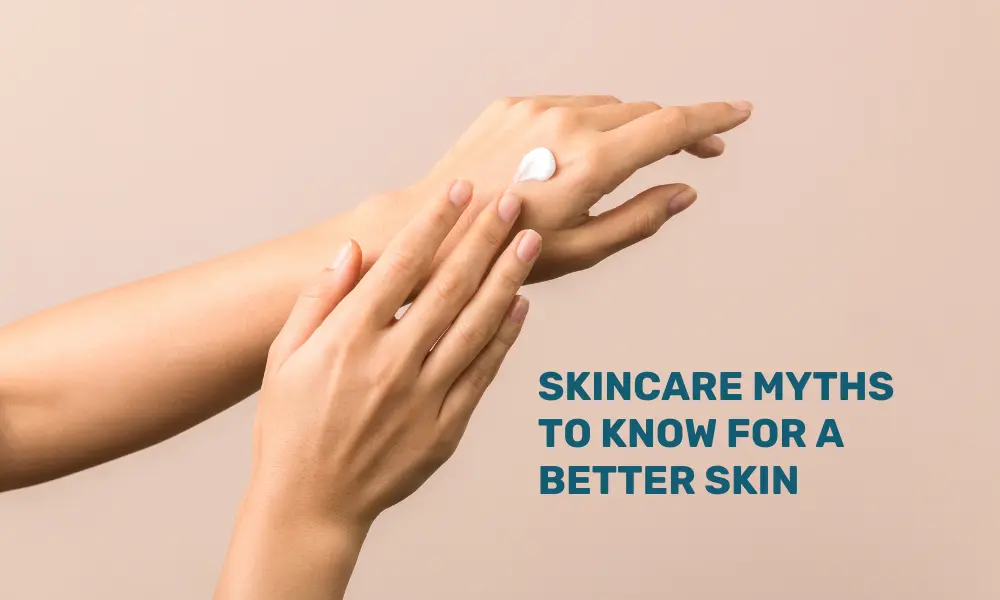Our skin is the largest organ of your body, making it essential to keep it flawless and glowing. With so many skincare products available in markets, it often becomes challenging to know what is good and bad for our skin.
But it is important to choose the right type of skin product so our skin gets good nourishment. Here are some skincare facts and myths that one should know in order to decide upon a good skincare routine.
Skincare facts and myths you should know:
-
Individuals With Oily Skin may not need Moisturizer: The biggest skincare myth is that people with oily skin don’t need to moisturize, but this is a misconception. Moisturizing our skin, irrespective of the skin type, is vital because it offers nourishment to our skin. Rather, not applying moisturizer can dry out the skin, triggering an overproduction of oil as a natural response. Therefore, people with oily skin must choose a non-comedogenic moisturizer that won’t clog the skin pores.
-
Toothpaste Treat Pimples: Absolutely No! The toothpaste may have a drying effect on a pimple, and the zinc in some toothpaste can offer anti-inflammatory benefits. However, ingredients like fluoride or menthol present in a toothpaste might irritate inflamed skin and potentially worsen the condition. Therefore, it is best to consult a dermatologist for appropriate treatment.
-
The SPF present in makeup is sufficient: Relying on the SPF in the makeup is not enough. Although some makeup, serums, or creams contain SPF, they don’t offer complete sun protection. These products typically shield our skin from UVA rays, but to truly guard our skin, we must apply products that provide protection from both UVA and UVB rays.
-
Antioxidants are effective in stopping wrinkles: Antioxidants are considered to be a great tool for reducing the effects of aging like wrinkles. However, antioxidants may prevent skin damage and reduce inflammation, but they do not reverse the signs of aging.
-
Natural Products Are Best: One of the common skincare myths is that chemical-free or natural products are a better choice for treating specific skin issues, as they do not contain synthetic ingredients. This is not true. However, choosing skincare products with gentle chemical ingredients having specific medicated properties helps relieve particular skin conditions. One must avoid harsh chemicals like PEG, alcohol, parabens, sulphates, or added fragrances, as they might irritate the skin.
-
Active ingredients work regardless of the formulation: This is a myth. Active ingredients rely on various elements within a formula to be effective. The type of ingredients used plays a crucial role in how well they penetrate the skin. The formula’s base—whether it is an emulsion, cream, lightweight serum, or essence—also significantly influences absorption.
-
One can wipe of wrinkles totally: We have many anti-aging products that claims like removing wrinkles overnight. However, it’s a common misconception that these products can completely erase wrinkles or other signs of aging, and such claims often turn out to be scams. Several anti-aging products are formulated with powerful ingredients like rosehip oil, retinol, or glycolic acid. These potent ingredients are effective for aging skin, as they can slow down the aging signs but not erase them magically. They work by improving collagen production and lowering the occurrence of wrinkles and fine lines. These products can take a few weeks to enhance skin elasticity and firmness but can’t erase existing wrinkles.
With these points in mind, one must choose skincare products carefully, as every skin type benefits from appropriate products and a consistent routine. Further do not expect instant results when starting a new skincare regimen. It may take some time, while you skin adopts to the skincare and reflects the results. Remember, your lifestyle, diet, and sleep are also crucial in achieving healthier skin. To consult a dermatologist, CLICK HERE.
FAQ on Skincare Myths
Does skincare help?
A skincare routine helps skin to maintain its health, keeping it healthy from pollution and weather change effects.
What is the chemistry behind skincare?
Chemical exfoliants such as alpha hydroxy acids (AHAs) and beta hydroxy acids (BHAs) are commonly used in skincare.





